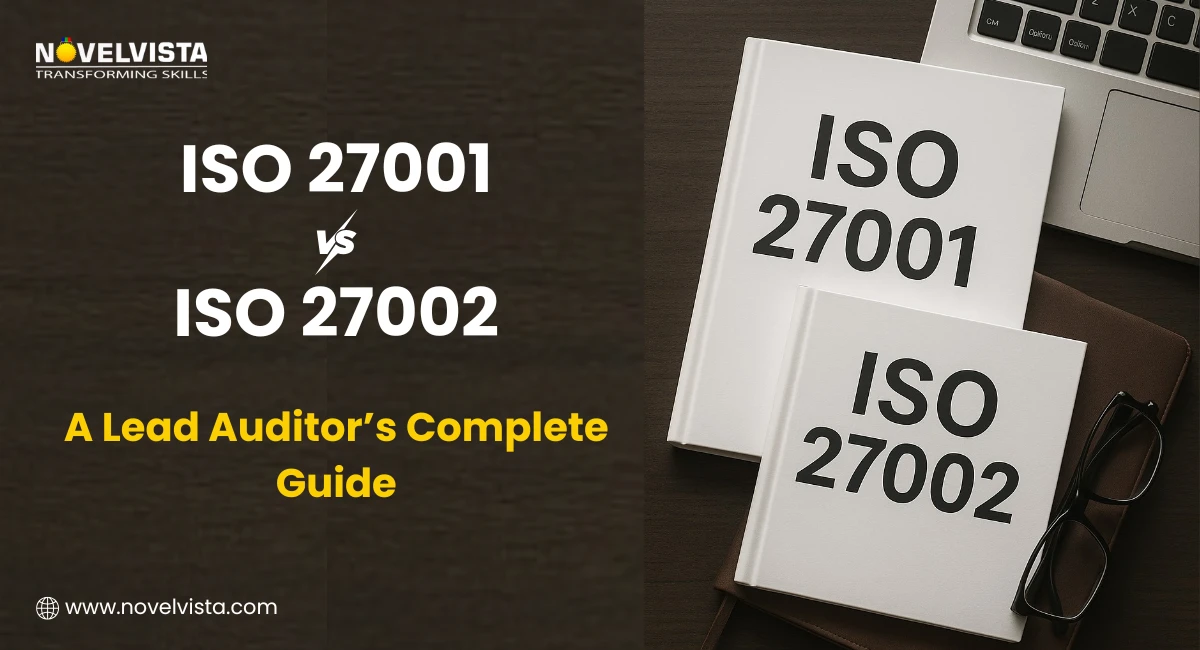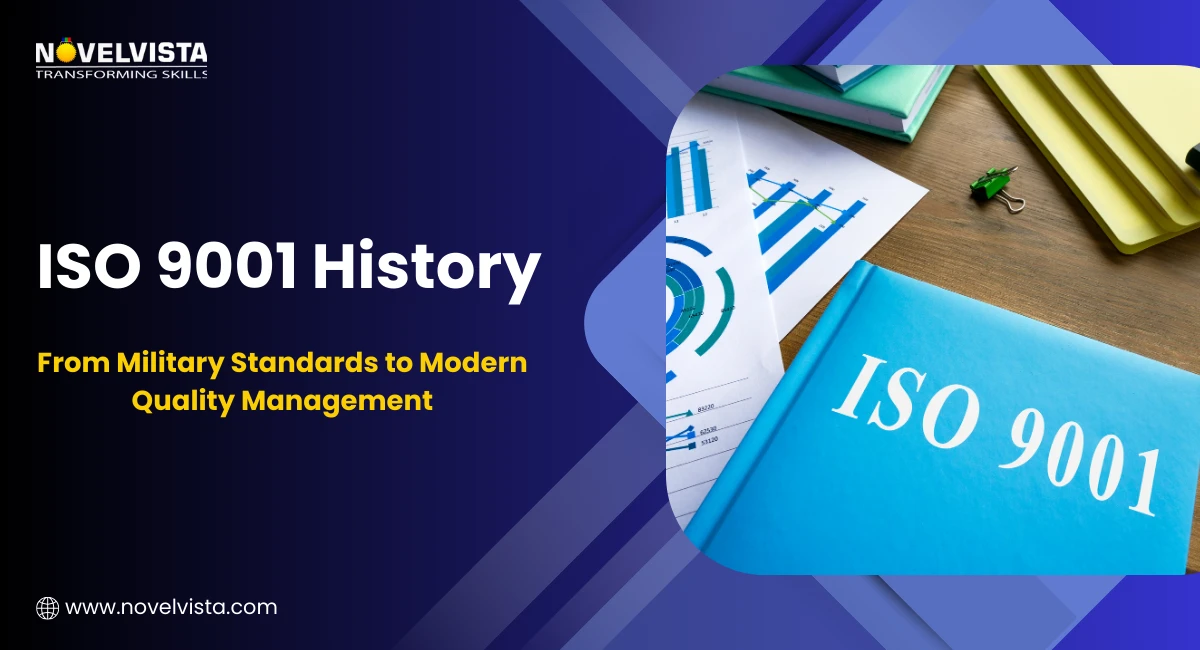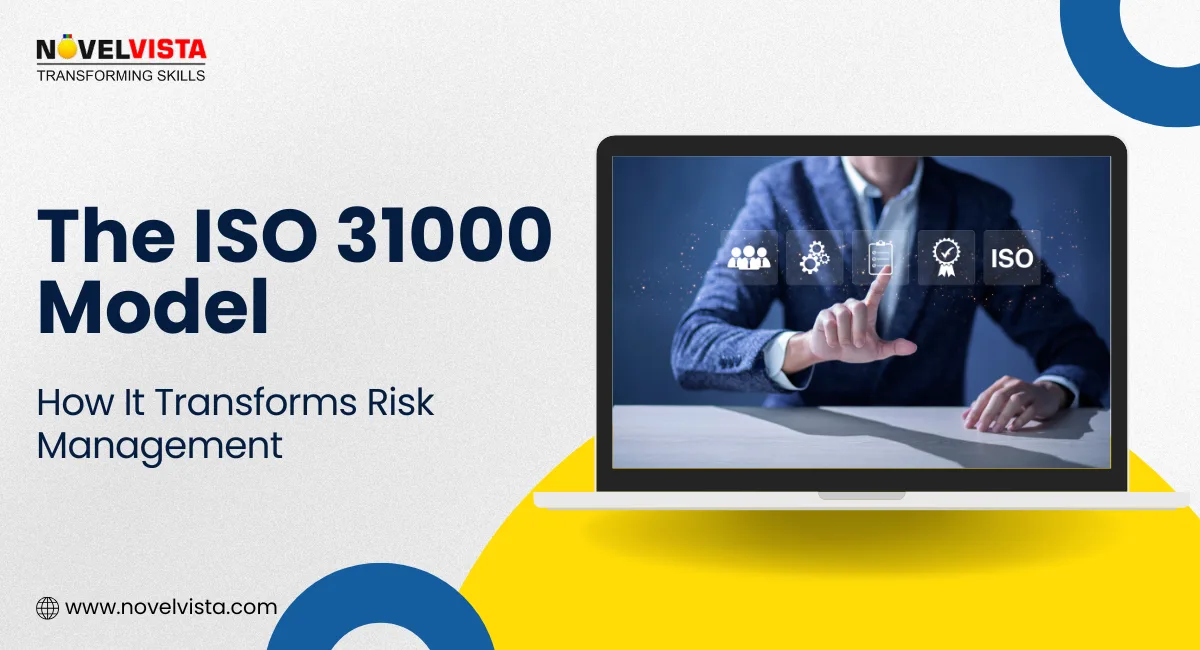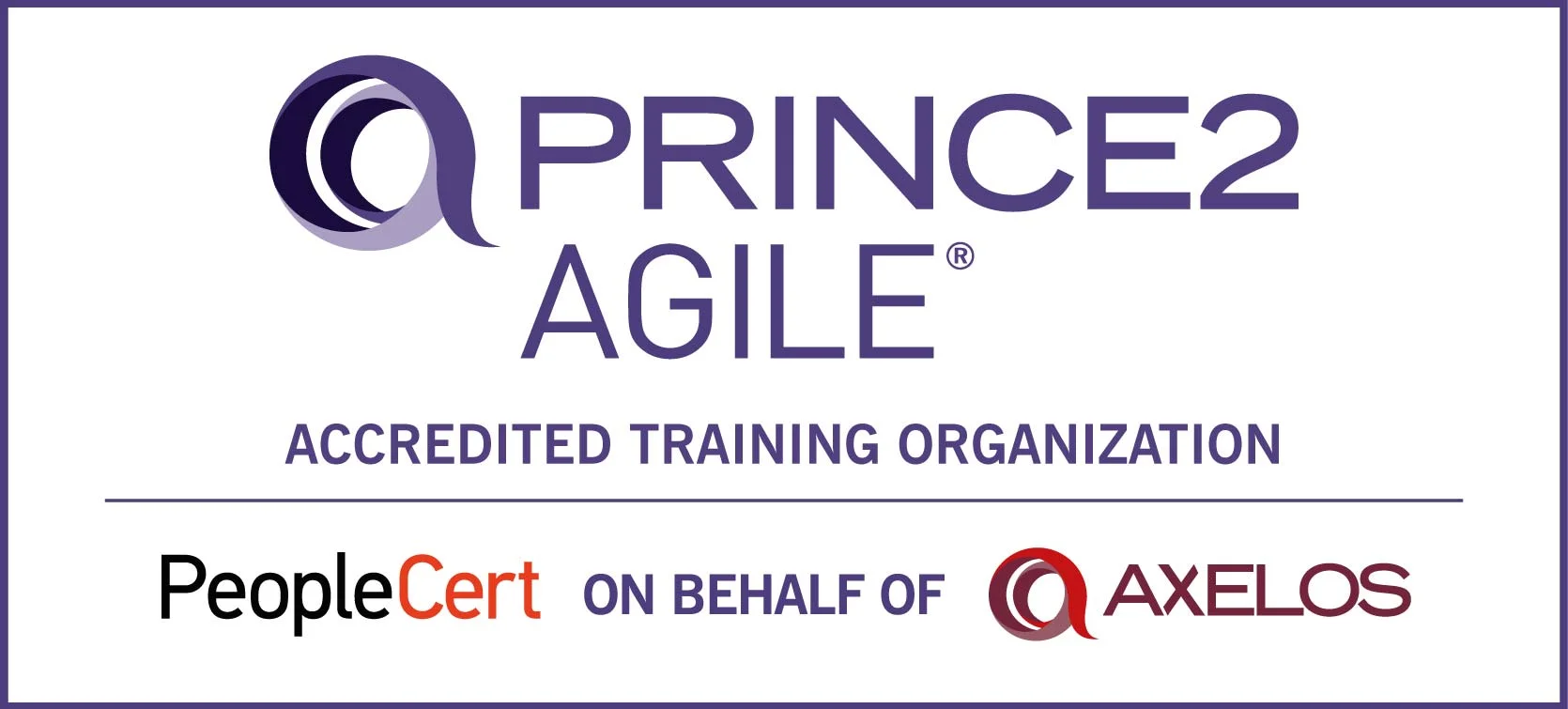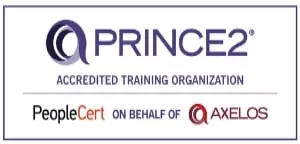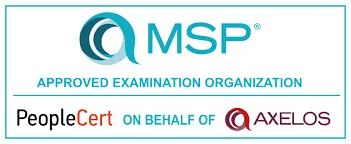- What is the ISO 9001 DIS Stage?
- Why the DIS Stage Matters for Lead Auditors
- Key Features of ISO 9001 DIS Relevant to Lead Auditors
- Organizational Impact of ISO 9001 DIS
- Business Benefits of Adopting ISO 9001 DIS Early
- Case Studies: How Lead Auditors Guide Organizations Through DIS
- Challenges Lead Auditors Face with ISO 9001 DIS
- How Lead Auditors Can Prepare for ISO 9001 DIS
- Conclusion: The Importance of ISO 9001 DIS for Lead Auditors and Organizations
- Next Step: Get Certified & Enhance Your Auditing Skills
Understanding the ISO 9001 Draft International Standard (DIS) is crucial for organizations and lead auditors alike. As the world’s leading quality management system (QMS) standard, ISO 9001 sets the benchmark for businesses striving to improve their processes and maintain high-quality standards. The DIS stage is one of the critical steps in the development of the ISO 9001 standard. It’s the phase where the draft gets reviewed and refined before being finalized. Lead auditors need to pay attention to this stage because it’s a vital moment for shaping future audits, helping organizations stay ahead of compliance requirements.
As the ISO 9001 certification evolves, keeping up with the DIS ISO 9001 helps auditors prepare organizations for upcoming audits and updates. Let’s dive into the Draft International Standard (DIS) and understand its significance for auditors and organizations.
What is the ISO 9001 DIS Stage?
The ISO 9001 DIS stage is part of the standard’s development cycle. After initial drafts (WD and CD), the Draft International Standard (DIS) is released. This stage is where the standard starts to take shape in its final form. Here's a quick overview of how the ISO 9001 development process works:
- WD (Working Draft): The first draft version is circulated for discussion.
- CD (Committee Draft): A more refined version goes out for further feedback.
- DIS (Draft International Standard): The document is near final and open for public comment. This is where most of the heavy lifting happens.
- FDIS (Final Draft International Standard): The last review before final approval.
- Published Standard: After the FDIS is approved, the standard is officially released.
During the DIS stage, the document is technically accurate and reflects the work done by the Technical Committee. It is also open for public comment, meaning people can suggest changes or raise concerns. These comments are reviewed, and if necessary, revisions are made before moving on to the final version.
Also Read: Complete Guide on ISO 9001 CertificationWhy the DIS Stage Matters for Lead Auditors
For lead auditors, understanding the DIS ISO 9001 stage is key to staying ahead of changes and preparing organizations for what’s to come. Here’s why it matters:
- Early Stakeholder Engagement: During the DIS ISO 9001 stage, feedback from industries, governments, and consumers is actively considered. Lead auditors who are familiar with the draft can understand where the standard is headed and prepare their organizations accordingly.
- Modernization of Standards: Standards evolve with time. The ISO 9001 Draft International Standard will reflect the latest global trends such as digital transformation, sustainability, and resilience. Lead auditors need to ensure their organizations adapt to these updates.
- Transparency: The DIS ISO 9001 document is available to the public, meaning lead auditors can access the draft requirements ahead of time. This gives auditors a chance to plan ahead, adjust audit strategies, and make recommendations before the official version is released.
- Practical Relevance: Lead auditors who track the DIS ISO 9001 closely can anticipate changes and help organizations stay compliant. By understanding the draft, auditors can guide organizations in making necessary adjustments during the transition to the final version of the standard.
Lead Auditor’s ISO 9001 DIS Strategy Playbook
Master ISO 9001 DIS with expert tips and strategies.
Build your audit skills and
stay ahead in quality management.
Key Features of ISO 9001 DIS Relevant to Lead Auditors
The ISO 9001 Draft International Standard is more than just a set of rules, it’s a framework for building better, more resilient organizations. As a lead auditor, here are some key features of DIS ISO 9001 that you should be aware of:
- Quality Management Principles: At the heart of ISO 9001 is the focus on quality management. The DIS will maintain the core principles of quality, including customer focus, leadership, and process approach. Lead auditors must understand how to assess these principles during audits.
- Risk-Based Thinking and Performance Metrics: The DIS ISO 9001 encourages organizations to focus on risks and opportunities, ensuring that business processes are optimized for both efficiency and effectiveness. Auditors will need to assess how organizations are managing risks and achieving their quality objectives.
- Documentation and Evidence Requirements: One of the biggest changes with ISO 9001 in recent years has been the shift toward less prescriptive documentation. The DIS will continue this trend, so auditors must know what evidence to look for when auditing processes.
- Process-Based Auditing Considerations: As a lead auditor, you will assess the organization’s processes based on how well they meet customer needs and drive continuous improvement. The ISO 9001 DIS will provide specific guidance on auditing processes within an organization.
- Continual Improvement Expectations: The DIS ISO 9001 will emphasize the need for continuous improvement. Auditors should assess how well organizations are improving over time and meeting their quality objectives. This includes checking how effectively organizations use corrective actions and preventive actions.
Organizational Impact of ISO 9001 DIS
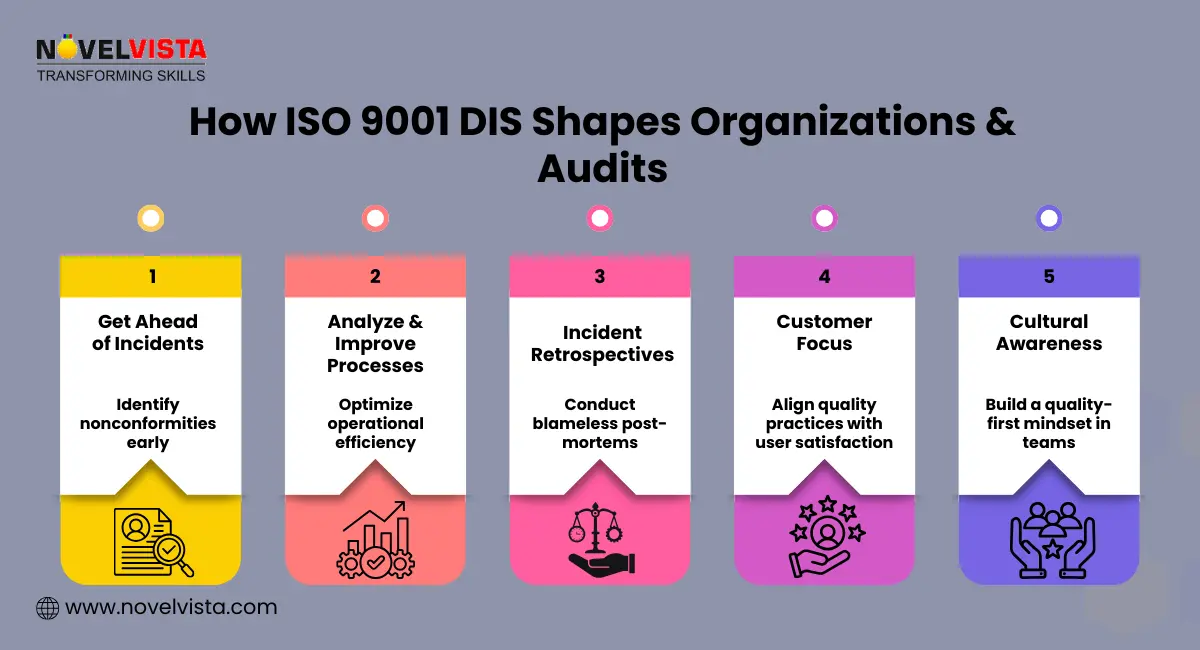
When lead auditors understand the ISO 9001 Draft International Standard, they can make a significant impact on an organization’s compliance strategy. Here’s how DIS ISO 9001 impacts organizations from an auditor’s perspective:
- Getting Ahead of Incidents: Lead auditors can identify potential nonconformities early in the process, ensuring that organizations address issues before they become major problems.
- Analyzing & Improving Processes: DIS ISO 9001 helps auditors focus on improving operational efficiency. By validating processes, auditors can ensure that organizations are not just meeting standards, but continuously improving them.
- Incident Retrospectives: The DIS ISO 9001 framework encourages blameless post-mortems. After an incident, auditors can ensure that the organization takes corrective actions and prevents the issue from happening again.
- Customer Focus: Auditors will increasingly focus on customer satisfaction metrics, which is a major focus of the DIS ISO 9001. Ensuring that the customer’s voice is heard in the quality management process is essential for audit success.
- Minimizing Compliance Gaps: Early familiarity with DIS ISO 9001 ensures that auditors are not caught off-guard by compliance requirements, allowing organizations to make smoother transitions to the final standard.
- Cultural Awareness: DIS ISO 9001 is not just about processes; it’s about creating a quality-first culture. Auditors play a critical role in encouraging organizations to embrace accountability and a focus on quality.
Business Benefits of Adopting ISO 9001 DIS Early
Adopting the ISO 9001 Draft International Standard (DIS) early not only prepares auditors for upcoming audits but also brings significant benefits to organizations. Here's how adopting DIS ISO 9001 can help businesses grow and improve:
- Enhanced Reliability & Availability: By aligning with the ISO 9001 Draft International Standard, organizations can ensure stronger compliance with quality management practices. This leads to more reliable and available services for customers, boosting trust and satisfaction.
- Efficiency Through Automation: As ISO 9001 emphasizes continual improvement and automation, adopting the DIS early allows organizations to streamline operations. Auditors can assess how automation tools are being utilized to reduce manual errors and improve operational efficiency, leading to cost savings and optimized workflows.
- Improved Incident Management: The DIS ISO 9001 approach helps organizations develop more effective incident management strategies. Auditors play a critical role in evaluating how organizations handle incidents, ensuring corrective actions are documented, and preventive measures are put in place.
- Scalability & Optimization: Implementing DIS ISO 9001 ensures that organizations are ready for growth. Auditors assess scalability, ensuring that quality management processes can support future growth without sacrificing quality or customer satisfaction.
- Data-Driven Auditing: Using SLIs (Service Level Indicators), SLOs (Service Level Objectives), and KPIs (Key Performance Indicators), auditors are equipped to assess how well organizations are meeting their quality goals. The DIS ISO 9001 framework helps guide the use of data in audits to measure and optimize performance.
Case Studies: How Lead Auditors Guide Organizations Through DIS
Let’s look at real-world examples to see how ISO 9001 DIS has impacted organizations and how lead auditors have guided them through the transition:
1. Manufacturing Example: Preparing for Risk-Based Auditing Updates
A large manufacturing company had to adjust its processes to meet the DIS ISO 9001 requirements related to risk-based auditing. The company worked closely with lead auditors to review their risk management strategies and ensure they were in line with the new DIS guidelines. This proactive preparation allowed the organization to avoid disruptions when the final version of the standard was released.
2. Service Industry Example: Adapting to New Sustainability Requirements
In the service industry, a company specializing in IT consulting needed to adapt to new sustainability requirements introduced in ISO 9001 DIS. Lead auditors helped the organization understand the new documentation and compliance requirements, ensuring they were ready for future audits. This shift towards sustainability not only improved their ISO 9001 certification status but also attracted new customers who valued environmentally conscious practices.
3. Lessons Learned for Auditors on Aligning Organizations with DIS Before FDIS
One of the key takeaways from these case studies is the importance of early engagement with the ISO 9001 Draft International Standard (DIS). Lead auditors who engaged early with DIS ISO 9001 were able to guide their clients through the transition smoothly. They helped organizations anticipate changes and stay compliant, ensuring minimal disruption once the final version was released.
Challenges Lead Auditors Face with ISO 9001 DIS
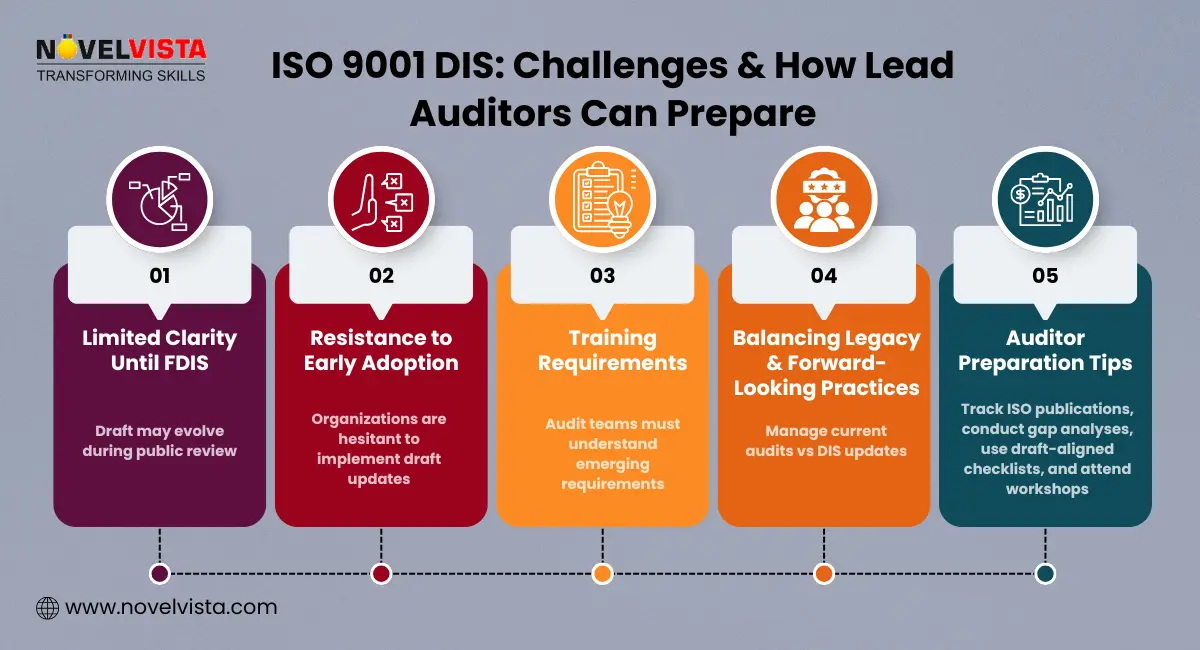
While the DIS ISO 9001 stage offers many advantages, there are also challenges auditors face when working with the ISO 9001 Draft International Standard:
- Limited Clarity Until FDIS Is Finalized: The DIS is a draft version, and there may be areas where clarity is limited. Auditors have to work with the draft requirements, which can evolve during the public comment period. This uncertainty can make it difficult for auditors to give final guidance on some areas.
- Resistance from Organizations to Adopt Draft Updates: Some organizations may be reluctant to adopt DIS ISO 9001 updates before they are finalized. This resistance can be due to the potential costs of making changes to processes or the uncertainty about whether the updates will remain in the final version. Auditors must help organizations see the benefits of getting ahead of the curve.
- Training Audit Teams on Emerging Requirements: ISO 9001 DIS introduces new auditing requirements, and auditors must keep their teams updated on these changes. This may require additional training and resources to ensure that auditing processes remain in line with the latest updates in the ISO 9001 Draft International Standard.
- Balancing Legacy Audits with Forward-Looking Practices: Lead auditors need to balance legacy audits, which might be based on the current version of ISO 9001, with the forward-looking practices required by DIS. This can sometimes create confusion or resistance, as organizations may feel the need to maintain their current practices while also preparing for future audits under the updated standard.
How Lead Auditors Can Prepare for ISO 9001 DIS
To ensure they are ready for ISO 9001 certification and the DIS ISO 9001 updates, lead auditors should take the following steps:
- Stay Updated with ISO Committee and Accreditation Body Publications: Lead auditors should keep an eye on the latest updates from the ISO committee and relevant ISO 9001 certification bodies. These publications will provide insights into changes in the ISO 9001 Draft International Standard and offer early access to drafts and updates.
- Conduct Gap Analysis Audits Aligned with DIS: Before the final version of ISO 9001 is released, auditors can conduct gap analysis audits to assess whether organizations are ready to meet the upcoming changes. This proactive approach allows organizations to make necessary adjustments before the FDIS stage.
- Train Organizations Using Draft-Aligned Audit Checklists: Auditors should develop and use audit checklists that align with DIS ISO 9001 to ensure organizations are ready for the changes. These checklists should cover all aspects of the ISO 9001 Draft International Standard and help identify areas that need attention.
- Engage in Workshops or Forums Interpreting DIS Requirements: Lead auditors should participate in workshops or forums where DIS requirements are discussed. This provides a platform for learning and allows auditors to stay ahead of the curve.
- Prepare Organizations for Smoother Transition to FDIS and Certification: Help organizations prepare for the FDIS phase by providing insights into the final version of the standard and ensuring they’re ready for the official release. A smooth transition from DIS ISO 9001 to FDIS will ensure ongoing compliance and minimal disruptions.
Conclusion: The Importance of ISO 9001 DIS for Lead Auditors and Organizations
The ISO 9001 Draft International Standard (DIS) is a pivotal stage in the development of ISO 9001 certification. Lead auditors must be proactive in understanding and preparing for these changes to help organizations comply and stay ahead of future requirements. The DIS ISO 9001 stage is more than just a draft; it's a roadmap for the future of quality management.
As the DIS ISO 9001 evolves, lead auditors will play a crucial role in guiding organizations through the updates, ensuring they are compliant with new requirements and ready for the FDIS release. Staying engaged with ISO 9001 DIS allows auditors to add significant value to organizations, helping them improve quality, efficiency, and compliance.
Next Step: Get Certified & Enhance Your Auditing Skills
Ready to master ISO 9001 Lead Auditor Certification? NovelVista’s ISO 9001 Lead Auditor Training will help you gain the knowledge and tools needed to navigate the ISO 9001 Draft International Standard and upcoming updates. Whether you’re new to auditing or looking to expand your skills, this training is your gateway to becoming a top-tier lead auditor.
Frequently Asked Questions
Author Details

Mr.Vikas Sharma
Principal Consultant
I am an Accredited ITIL, ITIL 4, ITIL 4 DITS, ITIL® 4 Strategic Leader, Certified SAFe Practice Consultant , SIAM Professional, PRINCE2 AGILE, Six Sigma Black Belt Trainer with more than 20 years of Industry experience. Working as SIAM consultant managing end-to-end accountability for the performance and delivery of IT services to the users and coordinating delivery, integration, and interoperability across multiple services and suppliers. Trained more than 10000+ participants under various ITSM, Agile & Project Management frameworks like ITIL, SAFe, SIAM, VeriSM, and PRINCE2, Scrum, DevOps, Cloud, etc.
Course Related To This blog
ISO 9001:2015 Lead Auditor Training and Certification
Confused About Certification?
Get Free Consultation Call



